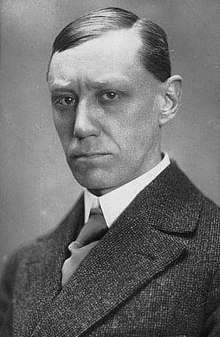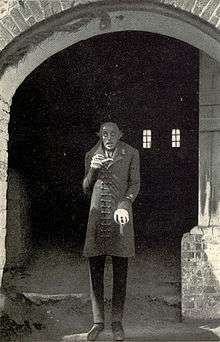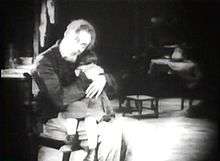Max Schreck
| Max Schreck | |
|---|---|
 Schreck in 1916 | |
| Born |
Friedrich Gustav Maximilian Schreck 6 September 1879 Berlin, German Empire |
| Died |
20 February 1936 (aged 56) Munich, Nazi Germany |
| Occupation | Actor |
| Years active | 1920–1936 |
| Spouse(s) | |
Friedrich Gustav Maximilian "Max" Schreck[1] (6 September 1879 – 20 February 1936)[2][3][4] was a German actor, best known for his lead role as the vampire Count Orlok in the film Nosferatu (1922).
Biography
Early life
Max Schreck was born in Berlin-Friedenau, on 6 September 1879. Six years later, his father bought a house in the independent rural community of Friedenau, then part of the district of Teltow.
His father did not approve of Schreck's ever-growing enthusiasm for theater. Schreck's mother provided the boy with money, which he secretly used for acting lessons, although only after the death of his father did he attend drama school. After graduating, he travelled briefly across the country with poet and dramatist Demetrius Schrutz.
Schreck had engagements in Mulhouse, Meseritz, Speyer, Rudolstadt, Erfurt and Weissenfels, and his first extended stay at the Gera Theater. Greater engagements followed, especially in Frankfurt am Main. From there he went to Berlin for Max Reinhardt and the Munich Chamber Games for Otto Falckenberg. From then on he began to work in films.
Schreck received his training at the Berliner Staatstheater (State Theatre of Berlin), completing it in 1902.[3] He made his stage début in Meseritz and Speyer, and then toured Germany for two years, appearing at theatres in Zittau, Erfurt, Bremen,[3] Lucerne,[3] Gera,[3] and Frankfurt am Main.[3] Schreck then joined Max Reinhardt's company of performers in Berlin.[5] Many members of Reinhardt's troupe went on to make significant contributions to the German film industry.[5]
Career

For three years between 1919 and 1922, Schreck appeared at the Munich Kammerspiele,[5] including a role in the expressionist production of Bertolt Brecht's début, Trommeln in der Nacht (Drums in the Night) (in which he played the "freakshow landlord" Glubb).[6] During this time he also worked on his first film The Mayor of Zalamea, adapted from a six-act play, for Decla Bioscop.[5] In 1921, he was hired by Prana Film for its first and only production, Nosferatu. The company declared itself bankrupt after the film was released to avoid paying copyright infringement costs to Dracula author Bram Stoker's widow, Florence Stoker.[5] Schreck portrayed Count Orlok, a character analogous to Count Dracula.[5]
In 1923, while still in Munich, Schreck appeared in a 16-minute (one-reeler) slapstick, "surreal comedy" written by Bertolt Brecht with cabaret and stage actors Karl Valentin, Liesl Karlstadt, Erwin Faber, and Blandine Ebinger, entitled Mysterien eines Friseursalons (Mysteries of a Barbershop), directed by Erich Engel.[7] Also in 1923, Schreck appeared as a blind man in the film Die Straße (The Street).[2][5]
Schreck's second collaboration with Nosferatu director F. W. Murnau was the 1924 comedy Die Finanzen des Grossherzogs (The Grand Duke's Finances).[5] Even Murnau did not hesitate to declare his contempt for the picture.[5] In 1926, Schreck returned to the Kammerspiele in Munich and continued to act in films surviving the advent of sound until his death in 1936 of heart failure.[8]
Personal life

Schreck was married to actress Fanny Normann,[5] who appeared in a few films, often credited as Fanny Schreck.
One of Schreck's contemporaries recalled that he was a loner with an unusual sense of humor and skill in playing grotesque characters. He also reported that he lived in "a remote and incorporeal world" and that he often spent time walking through forests.[8]
Death
On 19 February 1936, Schreck had just played The Grand Inquisitor in the play Don Carlos, standing in for Will Dohm. That evening he felt unwell and the doctor sent him to the hospital where he died early the next morning of a heart attack.[9] His obituary especially praised his role as The Miser in Molière's comedy play.[9] He was buried on 14 March 1936 at Wilmersdorfer Waldfriedhof Stahnsdorf in Brandenburg.[2]
Cultural references
The person and performance of Max Schreck in Nosferatu was fictionalized by actor Willem Dafoe in E. Elias Merhige's Shadow of the Vampire.[8] In a secret history, Shadow posits that Schreck was a real vampire.[10]
Dafoe was nominated for the Academy Award for Best Supporting Actor for his portrayal of Schreck.[11]
Scriptwriter Daniel Waters created the character Max Shreck (portrayed by Christopher Walken) for the Tim Burton film Batman Returns and compared him to the character Max Schreck played in Nosferatu.[12] Variety claimed the name was an in-joke.[13]
Selected filmography
- The Mayor of Zalamea (1920)
- The Story of Christine von Herre (1921)
- Nosferatu (1922)
- Nathan the Wise (1922)
- The Merchant of Venice (1923)
- The Pink Diamond (1926)
- Out of the Mist (1927)
- The Strange Case of Captain Ramper (1927)
- Doña Juana (1927)
- At the Edge of the World (1927)
- Luther (1928)
- Scampolo (1928)
- Serenissimus and the Last Virgin (1928)
- The Republic of Flappers (1928)
- Volga Volga (1928)
- Modern Pirates (1928)
- Fight of the Tertia (1929)
- Ludwig II, King of Bavaria (1929)
- Boycott (1930)
- The Land of Smiles (1930)
- A Man with Heart (1932)
- Boo! (1932)
- The Love Hotel (1933)
- A Woman Like You (1933)
- Must We Get Divorced? (1933)
- The Tunnel (1933)
- Knockout (1935)
- Donogoo Tonka (1936)
See also
- Category:Nosferatu for images related to the film
- Category:Images of Max Schreck for articles and Wikipedia-hosted media related to Max Schreck
Notes
- ↑ Eickhoff, Stefan. 2007
- 1 2 3 Brill, Olaf. 2004
- 1 2 3 4 5 6 Walk, Ines. 2006.
- ↑ All reliable sources agree as to Schreck's actual date of birth and date of death.(Brill, Olaf. 2004, Walk, Ines. 2006) However, at least until 9 March 2009 the Internet Movie Database had incorrect and self-contradictory details. (IMDB bio: "Date of Birth: 6 September 1879," ... "born on June 11, 1879" ... "Date of Death 26 November 1936," ... "death from a heart attack on February 19, 1936")
- 1 2 3 4 5 6 7 8 9 10 Enigmatic Max: The career of Max Schreck. Retrieved 26 December 2008
- ↑ Brecht, Willett and Manheim (1970, ix)
- ↑ McDowell, W. Stuart. "A Brecht-Valentin Production: Mysteries of a Barbershop", Performing Arts Journal, Vol. 1, No. 3 (Winter, 1977), pp. 2-14; and "Acting Brecht: The Munich Years," by W. Stuart McDowell, in The Brecht Sourcebook, Carol Martin, Henry Bial, editors (Routledge, 2000) p. 71 - 83.
- 1 2 3 Graham 2008 Page 2. Retrieved 2008-12-26
- 1 2 Brill 2004, Peter Trumm: obituary in Münchner Neueste Nachrichten vol. 89, no. 52, on 21 February 1936. "am Donnerstag früh um einhalb neun Uhr im Schwabinger Krankenhaus gestorben" (ie. 08:30 in the morning of February 20, 1936)
- ↑ Scott, A. O. (December 29, 2000). "FILM REVIEW; Son of 'Nosferatu,' With a Real-Life Monster". The New York Times.
- ↑ Nugent, Phil (2008-05-13). "Digging Up Max Shreck, the Screen's Original Dracula". Retrieved 2009-05-21.
The 2000 film Shadow of the Vampire, starring John Malkovich as Murnau, was a darkly comic fantasy in which it was revealed that "Shreck" was an actual vampire (played by Willem Dafoe) that the director had brought in to lend his authenticity to the role. It was rooted in a film-scholar in-joke that went back decades.
- ↑ "Batman YTB". Archived from the original on 2009-01-29. Retrieved 2009-05-21.
The script gave the writer (Daniel Waters) license to create his own villain in the form of Christopher Walken's nefarious Max Shreck, named after Max Schreck, the star of F.W. Murnau's NOSFERATU (1922).
- ↑ McCarthy, Todd (1992-05-15). "Batman Returns Review". Variety. Retrieved 2009-05-21.
Max Shreck, a character named, as an in-joke, after the German actor who starred as the screen's first Dracula in F.W. Murnau's 1922 "Nosferatu."
References
- Brill, Olaf. 2004. filmhistoriker.de. Retrieved 26 December 2008
- Graham, Dave. Book lifts lid on star of eerie first Dracula film. 9 May 2008. Reuters. Retrieved 26 December 2008
- Walk, Ines. film-zeit.de. February 2006. (German) Retrieved 14 July 2008
- Brecht, Bertolt (1970). "Introduction". In Willett, John; Manheim, Ralph. Collected plays: one. Plays, Poetry and Prose Ser. London: Methuen. pp. vii–xvii. ISBN 0-416-03280-X.
- Eickhoff, Stefan (2007). Max Schreck - Gespenstertheater (in German). Munich: Belleville Verlag Inh. Dr. Willi Michael Farin. ISBN 3-936298-54-8.
Further reading
- Eickhoff, Stefan (2007). Max Schreck - Gespenstertheater (in German). Munich: Belleville Verlag Inh. Dr. Willi Michael Farin. ISBN 3-936298-54-8.
- Eickhoff, Stefan. "Max Schreck - Gespenstertheater" (in German). Retrieved 2009-03-09. (summary of Eickhoff's biography/tribute of Schreck)
External links
| Wikimedia Commons has media related to Max Schreck. |
- Max Schreck on IMDb
- Max Schreck in the German National Library catalogue
- Max Schreck at Find a Grave
- Max Schreck, 1906(Pinterest)